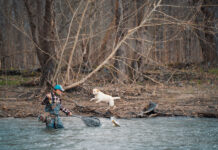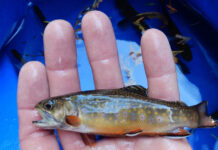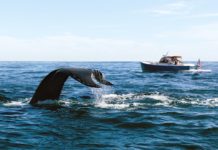Kirk Wallace Johnson — known as both the author of the bestselling nonfiction book “The Feather Thief” and the founder of The List Project, a nonprofit organization that has helped settle Iraqi refugees who worked for the U.S. government during the Iraq War — has a new project.
His recently published book, “The Fishermen and the Dragon,” set on the Gulf Coast of Texas, is the thrilling account of the confluence of an environmental disaster and Ku Klux Klan-led violence against Vietnamese immigrants. Touring to promote the book, Johnson will appear Aug. 28, as part of the Columbus Metropolitan Library’s Carnegie authors series.
Johnson served as the U.S. Agency for International Development regional coordinator for reconstruction in Fallujah, Iraq, in 2005. When the war ended, he worked to help Iraqi refugees just as he more recently has worked to help Afghan refugees after the fall of Kabul. His first book was his 2013 memoir, “To Be a Friend is Fatal: The Fight to Save the Iraqis America Left Behind.”
More:Exhibit’s Raphael tapestries weave powerful New Testament stories
In 2018, he published “The Feather Thief: Beauty, Obsession and the Natural History Heist of the Century,” telling the story of a young man obsessed with the art of fly-tying who stole hundreds of bird specimens for their feathers from a British natural history museum.
Both “The Feather Thief” and “The Fishermen and the Dragon” will become television miniseries with a major studio producing the former and George Clooney producing the latter.
Johnson, 41, who lives with his wife and two young children in Los Angeles, spoke recently by telephone with The Dispatch.
Question: “The Fishermen and the Dragon” is the first book about events in the 1970s and ‘80s on the Texas Gulf Coast when white shrimp fisherman tried to drive out Vietnamese refugees who were also fishing the bay ― even as factories were pouring chemical waste into the water and creating an environmental disaster. How did you get interested in this complicated scenario?
Johnson: I discovered the story the day my dad died (in Chicago) of Agent Orange cancer he got from his tenure in Vietnam. I was here in LA with my family, and it felt wrong to spend the day like any normal day, so I loaded my fishing gear into the car and drove to the Sierra Nevada (region) where there’s fly fishing. My dad had taught me how to fish, so I thought it was a way to commune with him. Along the way, the Bruce Springsteen song “Galveston” came on — about a Vietnamese guy in Texas duking it out with the Klan. I thought it was fictional but, of course, it wasn’t. I started doing research.
Q: There are so many different elements to the book — racism and anti-immigration views, the Vietnamese refugee experience, the intrusion and violence of the Klan, and the poisoning of the bay waters by factories. Was it hard to weave all that into one book?
Johnson: It was definitely the hardest thing I’ve ever written. I wrote the book probably three times. It was my entire pandemic project.
I thought it was just going to be a story about an unknown chapter of white supremacy in America, but it became increasingly clear to me that it was a soda-straw view of what happened down there — white supremacist harassment and violence against refugees but it comes into clearer focus when you realize it’s also an environmental story. A way of life was doomed by these huge forces — trade deals, development, dumping chemicals into the bay — that was making shrimping in the Gulf of Mexico less and less viable … For the white fishermen, it was easier to cast blame and beat up on refugees than fight a company like Alcoa.
Q: Over three years, you interviewed more than 100 people and ended up with nearly 3,000 pages of transcripts. Was it difficult to get many of the principal players — white shrimpers who burned Vietnamese boats and Klansmen, for example — to talk to you?
Johnson: My wife kept asking, why are these people talking to you and saying all this stuff? I am obsessive when it comes to preparing for interviews and the average length of an interview was five hours. Some approached 10 hours. … When I finally found David Collins, the captain of the Klan boat that burnt a bunch of crosses and stuff, he wasn’t a deer in the headlights. He was boastful about what he did.
More:Hanif Abdurraqib wins Ohioana award for nonfiction book about Black entertainers
Q: A heroine of the story is Diane Wilson, the lone female shrimper who recognized the harm the factories were doing to the bay and tried to organize shrimpers to do something. Is she still active?
Johnson: She just got arrested again recently for an environmental fight. She’s one of the most astonishing people. It would have been a dramatically different book if I hadn’t found her. She represents the sober person who was able to correctly diagnose the threat: Stop worrying about the refugees and pay attention to the shoreline.
Q: So many of the characters in “The Fishermen and the Dragon,” as well as in “The Feather Thief,” are a mix of good and bad. For example: Morris Dees, the lawyer who prosecuted the Klan in the Texas case. He was the founder of the Southern Poverty Law Center who later was thrown out of the Law Center for misbehavior.
Johnson: We seem to want to insist on absolutes in this country — black and white. We’re not so good dealing with gray. Dees did something very good in the Texas situation and you can’t erase that because he did something bad later.
Q: But Edwin Rist, a professional musician who was the feather thief, was never really punished for his crime. He seems pretty irredeemable.
Johnson: Justice was definitely not delivered there … that someone could do something that bad and not pay for it … He certainly provoked some strong responses in people. He’s still performing (flute) in chamber ensembles throughout Europe.
More:Take a self-guided tour of Columbus sculptures, murals and more using new Art Walks app
Q: Do you still fish?
Johnson: I have a 6-year-old and a 4-year-old, and I don’t like to abandon my family, so I don’t get to fish nearly as much as I used to, but when I do, it’s pretty much catch-and-release … I was in New Mexico a month ago to go fishing with Spencer Seim (the fly fishing guide who first told me about the feather thief.) … He’s received death threats for introducing me to the story.
Q: Are you still working with refugees?
Johnson: I’m involved now with several Afghans that are languishing to get out of that country. Last year, I was dragged out of retirement around the fall of Kabul … I know quite a few people in high places in government and I saw these people who needed help and I thought I have the contacts and should use them. The first time I missed a deadline was the day Kabul fell. “The Fishermen and the Dragon” was due that day and I missed it … Sadly, this issue (stranded natives who helped the U.S. government) seems to be a feature of all our wars.
negilson@gmail.com
At a glance
Kirk Wallace Johnson will appear at 2 p.m. Aug. 28, during a free talk at the Columbus Metropolitan Library, 96 S. Grant Ave. To register for the event, visit https://www.eventbrite.com/ .
Credit: Source link































